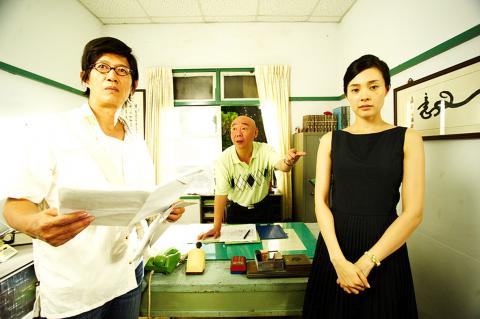Television cinematographer and director Lin Fu-ching (林福清) didn’t take the easy way out when it came to his debut feature Jumping Boy (不倒翁的奇幻旅程), a life-affirming children’s film that marries live action and animation. Though not the most exciting of movies, Jumping Boy deserves credit for combining real actors with animated elements while venturing into the territory of children’s cinema, a genre little visited by local filmmakers. Another merit is a lively cast led by eminent thespian Chin Shih-chieh (金士傑).
Chin plays Tian Bian, a celebrated children’s book author who rocketed to fame with his first published story, Roly-poly. But few people know that 20 years previously, the then-aspiring writer was repeatedly turned down by publishing houses and couldn’t sell any of the stories he wrote for his son, who was his most dedicated fan. One day, a friend of his son told Tian Bian a tale about a roly-poly doll. The writer took the story and passed it off as his own. Roly-poly became a best-selling book that brought Tian Bian fame and fortune, but the writer was never able to regain his son’s trust after the incident.
Back in the present day, Tian Bian decides to go back to his hometown in Tainan to find the boy he stole from and make amends. But instead of the boy, the aging writer meets Ka (Mai Hao-wei, 買皓瑋), an elementary school student who lost a leg to bone cancer. A friendship quickly develops between the two as they explore the pastoral town together and find strength in each other’s company along the way.

Photo courtesy of Activator Marketing Company
Director Lin reportedly invested three years and a personal bank loan worth NT$20 million in the work, which was inspired by a documentary he made in 2007 about a group of young children living with from bone cancer. Most of the movie takes place in the director’s hometown of Zuojhen (左鎮), Greater Tainan, where the mountainous, rugged landscape serves as a surreal backdrop for the film as it swings between reality and the fantasies told by Chin’s character.
Content-wise, the film is more about one man’s efforts to come to terms with his past than an imaginative portrait of the world as seen through the eyes of children. The story’s structure is a loose thread and risks losing the audience’s attention with its slow approach to storytelling. The already thin material is stretched even more in the middle of the movie.
The film’s five animated segments, totaling 25 minutes in length, are attention-grabbing. Beautifully realized by artist and professor Jack Shih (史明輝) and his team of student animators, each piece shows a distinctive style and can be appreciated as an individual work in its own right. Three of the five animated works have since entered the international film circuit and have been screened at showcases including the International Festival of Animated Films AniFest in the Czech Republic, Sapporo Short Film Festival in Japan and the International Short Film Festival Oberhausen in Germany.

Photo courtesy of Activator Marketing Company

Photo courtesy of Activator Marketing Company

The 2018 nine-in-one local elections were a wild ride that no one saw coming. Entering that year, the Chinese Nationalist Party (KMT) was demoralized and in disarray — and fearing an existential crisis. By the end of the year, the party was riding high and swept most of the country in a landslide, including toppling the Democratic Progressive Party (DPP) in their Kaohsiung stronghold. Could something like that happen again on the DPP side in this year’s nine-in-one elections? The short answer is not exactly; the conditions were very specific. However, it does illustrate how swiftly every assumption early in an

Towering high above Taiwan’s capital city at 508 meters, Taipei 101 dominates the skyline. The earthquake-proof skyscraper of steel and glass has captured the imagination of professional rock climber Alex Honnold for more than a decade. Tomorrow morning, he will climb it in his signature free solo style — without ropes or protective equipment. And Netflix will broadcast it — live. The event’s announcement has drawn both excitement and trepidation, as well as some concerns over the ethical implications of attempting such a high-risk endeavor on live broadcast. Many have questioned Honnold’s desire to continues his free-solo climbs now that he’s a

Francis William White, an Englishman who late in the 1860s served as Commissioner of the Imperial Customs Service in Tainan, published the tale of a jaunt he took one winter in 1868: A visit to the interior of south Formosa (1870). White’s journey took him into the mountains, where he mused on the difficult terrain and the ease with which his little group could be ambushed in the crags and dense vegetation. At one point he stays at the house of a local near a stream on the border of indigenous territory: “Their matchlocks, which were kept in excellent order,

Jan. 19 to Jan. 25 In 1933, an all-star team of musicians and lyricists began shaping a new sound. The person who brought them together was Chen Chun-yu (陳君玉), head of Columbia Records’ arts department. Tasked with creating Taiwanese “pop music,” they released hit after hit that year, with Chen contributing lyrics to several of the songs himself. Many figures from that group, including composer Teng Yu-hsien (鄧雨賢), vocalist Chun-chun (純純, Sun-sun in Taiwanese) and lyricist Lee Lin-chiu (李臨秋) remain well-known today, particularly for the famous classic Longing for the Spring Breeze (望春風). Chen, however, is not a name